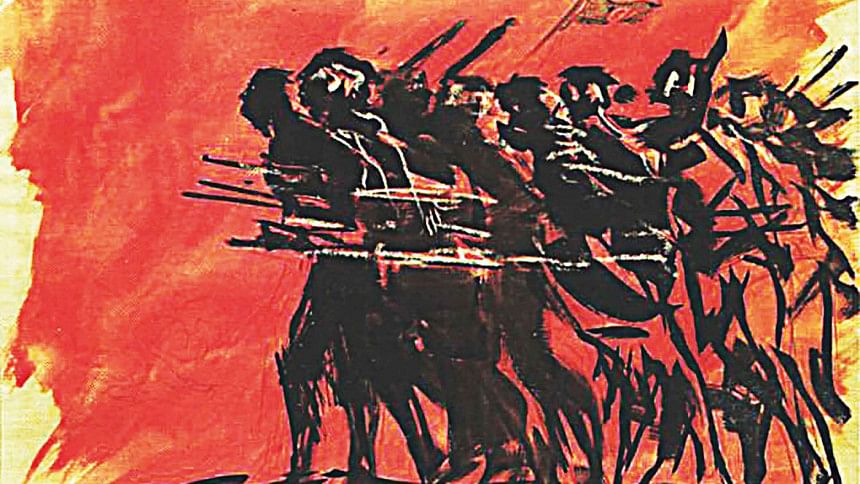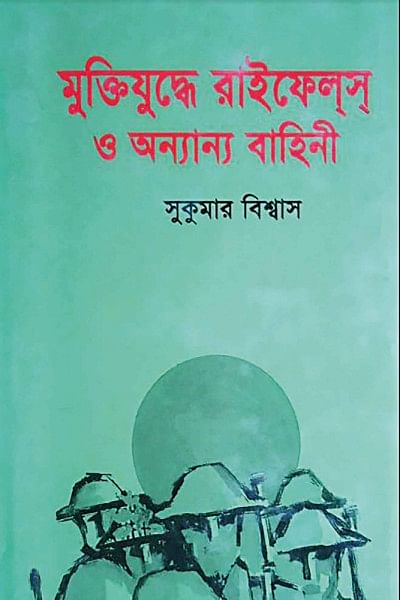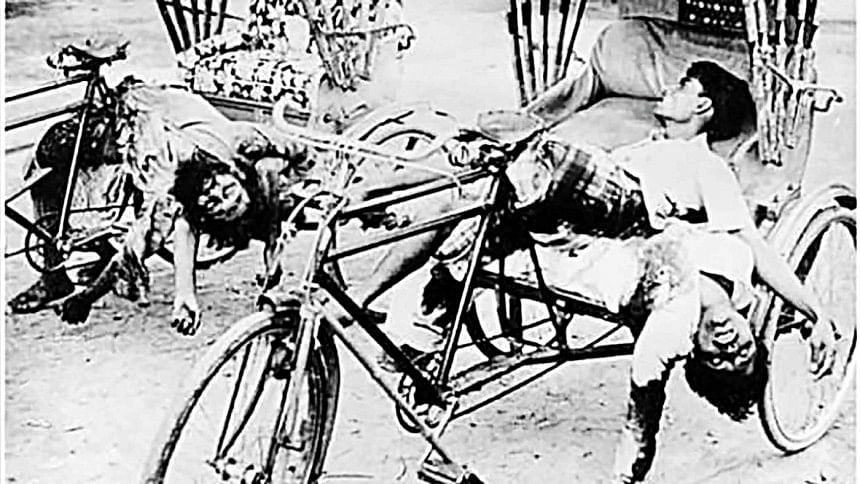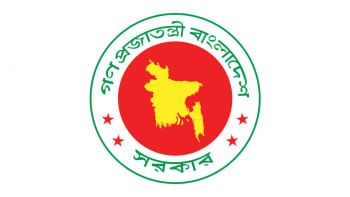The Historian and the Riflemen

On the evening of the 25th of March of 1971, Yahya Khan, third President of Pakistan, was driven from an elegant, storied house at 22, Baily Road – "President's House" – to the Tejgaon airport. That night he left Dhaka for Karachi, never to return. The house is still there, though now it is called "Sugandha", and belongs to an academy run by the Ministry of Foreign Affairs. As Yahya Khan left Baily Road he drove past a hundred men in the uniform of the East Pakistan Rifles: his security detail. The political climate in Dhaka was then incandescent, and special arrangements for Yahya Khan's security had been made all across the city: policemen, soldiers from the East Pakistan Rifles, and troops from regiments recruited in the western wing of Pakistan were manning checkpoints and barricades across the city, or waiting for orders in their barracks, ready for action.
The story of the six meetings that Yahya Khan held with Sheikh Mujibur Rahman at the President's House between the 15th and 25th of March is well-known. So is the story of Mujib's subsequent arrest, and of the massacre that Yahya Khan had planned in secret, which began later that night, following his departure. But not all stories of the fateful night of the 25th have received the attention they deserve. One of the most chilling has come down to us from the reminisces of two sentries – Naik Mujibul Haq and Naik Mohammad Ali – who were deputed to keep guard over President's House that week, and who were murderously betrayed by the President they had stood guard for. Their story would have been lost, had it not been recorded in 1974-5 by the historian Sukumar Biswas, an indefatigable collector of liberation war memories and an early researcher of the Jatiya Swadhinatar Itihas Parishad, whom he had joined in 1972. Biswas eventually published a summary of their account in his remarkable 1999 Muktiyuddhe Rifles.
Historians, disciplinarily invested in the causes of events, like to take the long view of things: the tragic story of Haq and Ali is perhaps forgotten because it reminds one that the mute and mindless violence of a day may still transform and change everything, and that even events that have seemed, for a very long time, inevitable, like the achievement of independence, might coincide with the most tragically unanticipated, such as the butchery of "Operation Searchlight". Bangladesh certainly was, as a great many have written, long in the making: the vast democratic movement behind it was unshakable, and its roots were deep and wide. Yet for many of the Bengali soldiers of the then Pakistan army, or the policemen of the city who survived the night of the 25th March and joined the fight for Bangladesh, the experience of surviving Searchlight marked a true break between the Pakistan that had been and the Bangladesh that would be.
In many ways the events of that tragic night accelerated and compressed time, inspiring soldiers to join a decades-long struggle they had previously only avoided or policed, and in the worst of cases, even repressed. The past notwithstanding then, on the night of the 25th of March Bengali soldiers and policemen, cruelly betrayed by their commander-in-chief and by their comrades from the western wing had to find a new freedom in the necessity of resistance. That night, as many witnesses recognized, transformed the Bengali soldiers of the Pakistan army into muktijoddhas. Bir Uttam K.M. Safiullah, on that fateful night a Major with the 2nd Bengal in Joydebpur, noted years later in one of the liberation war's most lucid and haunting memoirs that the "unparalleled savagery" unleashed by troops from West Pakistan upon their "aspiring and unsuspecting fellow brothers" finally split what was a single army into two: resistant Bengalis and occupying Pakistanis. "The edifice of friendship broke and there was no illusion": the liberation war had begun.
The building that Haq and Ali guarded, now largely forgotten, was, in the 1960s, a Dhaka institutional landmark. It was, as the name makes obvious, the address where visiting Presidents of Pakistan customarily stayed, and their stays in the city were rare and consequential affairs. Throughout the 1960s the rooms of the House stood almost always empty, gathering dust: only once or twice a year their stillness would be interrupted by the trudging sound of heavy boots, the barking of orders, and the presence of uniformed men, signaling that the President of Pakistan had actually come to rule in the country's most populous province. Perhaps it can be said that the goings-on at 22 Baily road reflected in a general way the institutional relationship then developing between Pakistan's military rulers and Bengal: the inattentive neglect of a distant and occasionally predatory rule, interrupted only by the vehement reassertion of the President's authority in moments of crisis and contestation.
A rereading of the political history of the 60s makes it clear that it was only when the President's presence seemed necessary that the President would actually descend from the tarmac of the Tejgaon airport to the lawns of President's House. Yahya Khan's predecessor and model – General Ayyub Khan – once flew in to dismiss the province's governor in a meeting that lasted mere minutes. Almost as if by an unwitting metaphor President's House was also the place where the State hosted foreign sovereigns on their visits of Dhaka. When the Queen of England or the Emperor of Japan visited the city, they were both put up at President's House. It did not strike many that it could be out of place for the President of Pakistan to share his Dhaka lodgings with the foreign heads of state of distant islands.

Yahya Khan followed his predecessor's example in avoiding Dhaka until forced by insurmountable circumstances to reckon with the city. A disastrous cyclone, callously mishandled by his cynical administration, was followed by the Awami League's resounding electoral victory in the 1970 general elections: military rule was coming to an end. All this made Yahya Khan's stay in the Baily Road house inevitable, if only to shore up the crumbling authority of the junta he headed. Between November 1970 and January 1971, Yahya stayed at President House thrice, and his arrival on March 15th marked the beginning of what was to be his fourth and last visit.
Things were by then completely different: the election had handed over an incontestable, plebiscitary mandate to Sheikh Mujibur Rahman to transform the constitutional arrangements of Pakistan once and for all. A popular non-cooperation movement meant that even Yahya's choice for governor, the infamous Tikka Khan, could not be legitimately sworn into gubernatorial office, and there was talk of independence everywhere. Mujib's electrifying speech of the 7th of March affirmed in all who heard it the conviction that things would not remain the same. In a small but significant episode recounted by rifleman Mohammad Asraf Ali Sardar to Biswas in 1974, some eight or nine troopers of the East Pakistan Rifles even raised a Bangladesh flag on a tree at the Pilkhana barracks in Dhaka. At the time a young schoolteacher, Biswas himself remembers the effects of Mujib's speech in provincial Chuadanga: "People became more vocal, more militant. They were braver, and I noticed they would do something now" he told a fellow historian in 2005. Mujib's most determined adversaries were as just as fearfully certain that all might change as the Bengalis were hopeful. But the junta was also pursuing a new line of thinking, out of the grotesque belief that terror would solve what its political impotence could not overcome, and that an absent legitimacy could spring from fear.
Naik Mujib Haq and Naik Mohammad Ali might not have seen the President leave. But in interviews with Sukumar Biswas they stated that at dusk on the 25th of March soldiers from the Punjab Regiment's Artillery and Engineering Battalions came to President House, drawing up close to the riflemen on guard. After this, the commanding officer of the Dhaka sector, Lt. Colonel Anwar Shah ordered the disarming of the two companies of soldiers of the East Pakistan Rifles then present as guards at the house: the president had left, he said, they could now rest. At half-ten at night, in the quiet silence of the barracks, the Bengali soldiers of the EPR guard at President's House were arrested. "Operation Searchlight" had begun.
The history of "Operation Searchlight" that night in Dhaka is too well-known to narrate at length. During the night a unit of Commandos arrested Shaikh Mujib at his Dhanmondi home, the 22nd Baloch Regiment attacked the East Pakistan Rifles at Pilkhana, the 32nd Punjab Regiment machine-gunned the policemen at the police lines at Rajarbagh, while the 18th Punjab Regiment started a massacre of civilians in Puran Dhaka. A special unit composed of soldiers from all the above units attacked the students and faculty of Dhaka University, executing Muslims and Hindus at Iqbal and Jagannath hall alike, and shooting faculty and staff in their lodgings. The buildings of Dhaka's newspapers were razed or torched. West Pakistan's premier politician, Zulfikar Ali Bhutto, who was staying at the Intercontinental hotel, remembered watching from his balcony artillery fire hitting the Shahbagh newspaper People, which, he commented, had "provoked" the army with its intemperate headlines. What had been Manik Mia's legendary Ittefaq was burned to the ground the following night, the Sangbad was torched the day after with one of its foremost writers, Shahid Saber, burning alive inside the building.

For the Bengali members of the security detail of President's House, then under arrest, things would worsen still. At some point, Mujibul Haq and Mohammad Ali remember, non-Bengali riflemen divided the prisoners into three groups. A first group was called out, name by name, and disappeared. A while later Haq and Ali too were called, and they left the premises alongside Havildars Akram Ali, Mumtaz, Farid, and fellow Naiks Abdus Samad, Mumtaz, Asab Ali, Amar Ali and Mobarak Ali. They were taken to a vehicle where an East Pakistan Rifles Major, Golam Mohammad – one of their former commanding officers – was waiting, and they were immediately driven to the nearby Ramna park by the Major. There they walked to a side of the Kali temple, which by all accounts had been shelled or torched by the Pakistan army the previous night. There they were shot. Naik Mujibul Haq and Naik Mohammad Ali survived, hiding under corpses until they could make their escape. Muhammad Ali joined the crowds fleeing Dhaka, and eventually became a freedom fighter with the muktijoddhas of the Sector 8. Mujibul Haq, wounded, found refuge in a mosque, and then, helped in secrecy and at great risk by a doctor at Mitford hospital, made his way out of Dhaka to join the liberation army. For this, the doctor was later taken into custody.
"Searchlight" was premised, as observers in Bangladesh have long noticed, on a dreadful contempt for politics and the democratic aspiration of the people of East Bengal. If Pakistan's military junta could not be loved, generals opined, it should at least be feared. "It's main aim" Maidul Hasan, a close aide to Tajuddin Ahmed in those fateful days and the author of the 1986 classic Muldhara '71 "was to found anew loyalty in the Pakistan state by inducing an incomparable terror amidst the people of East Bengal". But the experience of unprovoked aggression and wanton terror was also a clarifying one, severing all ties and breaking the "illusion" of comradeship between Pakistani and Bengali soldiers in the same army, sometimes even in the same units, and making them strangers and enemies to one another. Those Bengali soldiers and policemen who survived the night, whether simple Naiks like Ali and Haq, or illustrious officers like K.M. Safiullah found their residual commitments to Pakistan abrogated, and their loyalty to their incipient nation of Bangladesh affirmed. As a result of "the slaughter in the heart of Dhaka" Maidul Hasan noted, events "took a turning towards a completely new path".
The Pakistan state's meticulous plans for the destruction of Dhaka, and its callous desire to "neutralize" Bengali soldiers and policemen invariably meant that it was the Pakistan state itself that had betrayed the Bengalis, and so dissolved any and all remaining obligations tying Bengalis to Pakistan. The fact that so many of the accounts written by the Pakistani officers who presided over the night-time attack mounted on the army's Bengali troops emphasize the "treason" of the Bengalis is an egregious case of projective identification – the psychological mechanism in which one's pathological, aggressive drives are attributed and ascribed instead to one's victim, producing the switching of victim and aggressor, betrayer and betrayed. No other "police operation" by a state before or since has started with the slaughter of its own security apparatus, and few other commanders who have ordered the killing of their soldiers in their barracks have ever had the nerve to accuse those they ordered to be murdered of "betrayal".
Yet by determinedly and ruthlessly turning against its own Bengali soldiers, the junta chose to estrange itself completely from the country and to transform itself into an army holding Dhaka by sheer force of violent conquest. The unprecedented fact of a president and army chief and a governor and police chief "neutralizing" – their military euphemism – their own soldiers and policemen showcases just the extent to which Operation Searchlight grotesquely parodied a war of subjugation waged against a foreign country. But the accounts of the survivors collected by Biswas indicate that surviving the horrors of betrayal and execution steeled in the riflemen who lived the sentiment of being soldiers of Bangladesh. For those working for the cause of Bangladesh the night effectively transformed what had previously been a constitutional and political movement into a liberation army. As a result of "Searchlight" two humble naiks, deputed only hours early to the security of the President found themselves waging a war against him, and against those treacherous comrades who the night before had tried to execute them.
Reflecting on his contributions to the ninth volume of the classic collection edited by Hasan Hafizur Rahman – the Bangladesher Swadhinata Juddha Dalilpatra – Biswas noted that, with the non-cooperation movement growing in strength in March 1971 all was set up for "an unequal contest between the Pakistan army equipped with modern weapons of war" and an unarmed, mass popular movement. But as the crackdown began, "the soldiers of the Bengal regiment, of the East Pakistan Rifles, the members of the police and the Ansar came to stand by the side of the people". With the division of the old army, and the cruel collapse of the comradeship of the barracks – an "illusion", as major-general K.M. Safiullah later eloquently put it – came the new, future-oriented fraternization of soldier and student, policeman and party-worker: the unification of Bangladesh' people. Biswas' precious Muktijuddhe Rifles is an invaluable collection of some of the stories of how this came about, even in the darkest of nights.
Thomas Newbold is a PhD Candidate at the Department of History and South Asian Languages and Civilizations, University of Chicago and a former lecturer at BRAC University.
Guidelines for In Focus submissions:
The Daily Star In Focus welcomes your submissions on issues that are relevant, timely and of public interest. If you want to submit an article or pitch an idea for an article for the page please email us at [email protected]

 For all latest news, follow The Daily Star's Google News channel.
For all latest news, follow The Daily Star's Google News channel. 



Comments